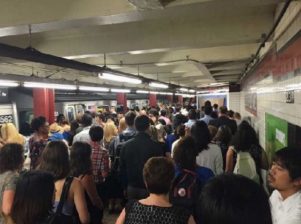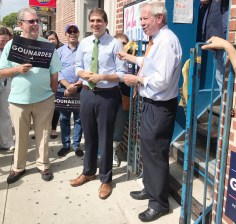Insurgents Topple Incumbents in a Democratic Primary That Bodes Well for Congestion Pricing
If Democrats gain even a single State Senate seat in November, the political terrain for congestion pricing will look even better.

A wave of anti-establishment energy carried insurgents to victory in several primaries for seats in the state legislature Thursday, sweeping aside the faction of Democrats who for years caucused with Republicans in the State Senate.
Angry at the breakaway Independent Democratic Conference for defecting from their own party to team up with the Senate GOP, voters came out in large numbers to reject members of the IDC. Turnout in some Senate districts was four times higher than in 2014.
The winning challengers include several candidates who staked out stronger positions on congestion pricing, transit policy, and street safety than the incumbent Democrats they defeated. Five candidates endorsed by StreetsPAC knocked out sitting legislators. The most consequential of those wins belonged to Alessandra Biaggi, who vanquished IDC ringleader Jeff Klein, a mainstay of the Bronx Democratic machine.
This primary was a watershed event for the State Senate’s Democratic conference. When the legislature convenes again, the Senate will have fewer cynical, listless Democrats doing as little as they can for transit riders, and more energetic newcomers who ran on promises to do right by their subway- and bus-riding constituents — i.e., most New Yorkers.
If Democrats retake the Senate in November, the path to enacting landmark legislation like congestion pricing will be clearer than ever, while a replay of this year’s failure to expand NYC’s speed camera program will be nearly unthinkable.
The statewide results were less dramatic. In the end, Governor Andrew Cuomo didn’t have to sweat the challenge from Cynthia Nixon, but her campaign forced Cuomo to defend eight years of failed transit policy, during which the quality of subway and bus service took a nosedive. Transit was a more prominent issue in this governor’s race than any in recent history, and Cuomo had to repeatedly reiterate his support for congestion pricing.
When Nixon hammered Cuomo on transit, it echoed in the down-ballot races. Several State Senate challengers articulated thoughtful positions on congestion pricing, reining in transit capital costs, and how they plan to provide oversight of the MTA once in office. Many of those challengers will be seated in Albany next session.
While this election will transform the Democratic conference in the Senate, the resounding defeat of Klein and several other IDC members will not be sufficient to change the balance of power. As long as the Senate Republican caucus includes Simcha Felder (who defeated challenger Blake Morris yesterday), Democrats still need to pick off at least one sitting Republican in the general election to gain control of the chamber.
Before we get to November, here’s an overview of the major State Senate results from yesterday.
District 34: Alessandra Biaggi dethrones Jeff Klein
Jeff Klein is the Joe Crowley of the state primaries — an alpha dog of New York City politics toppled by a charismatic woman running for office for the first time. Alessandra Biaggi never let voters forget Klein’s role leading the IDC and how he divided the Senate Democrats. Now she’s heading to Albany to represent the Bronx seat Klein held for 14 years.
Biaggi captured the StreetsPAC endorsement with her support for congestion pricing and speed cameras. Her victory may also pay immediate dividends: She endorsed a road diet for Morris Park Avenue that DOT has been hesitating to implement. Klein didn’t take a position on the project when we asked his office about it, but his buddies at the Morris Park Community Association are fighting it tooth and nail. Biaggi’s win might give DOT the confidence to go ahead and restripe the street.
In recent sessions, Klein was a sponsor and supporter of speed camera legislation. But longtime Streetsblog readers will also remember Klein as a congestion pricing opponent in 2008, a panderer to motorist entitlement, and a road rager who could snap at any moment. He belongs to a cohort of legislators who were apathetic, at best, about using their influence to improve transit, and whose numbers in Albany are dwindling thanks to challengers like Biaggi.
District 13: Jessica Ramos knocks out Jose Peralta
IDC member Peralta also sponsored speed camera legislation, which may explain StreetsPAC’s reluctance to endorse Ramos. But when questioned by Streetsblog, it was Ramos who gave the more straightforward affirmation of protected bike lanes and other street redesigns for her district, while Peralta hedged his support for the 111th Street redesign.
Don’t think the voters didn’t notice. “I have a bike that I can’t even use,” Ramos voter Martha Leve told Streetsblog outside a polling place in Jackson Heights. “There’s a lot of accidents; people don’t care and they don’t really do anything in Queens, and I think she will [make] a difference in Queens.”
District 18: Julia Salazar defeats Martin Dilan
The soap opera that was the Salazar campaign is coming to Albany, ending Dilan’s perfunctory eight-term, 16-year tenure in the State Senate. Say what you will about her personal history, in her Streetsblog Q&A, Salazar gave the strongest defense of street redesigns of any candidate, saying, “I reject arguments that halt or kill projects that are proven to save lives in order to save a handful of parking spots.”
District 20: Zellnor Myrie overpowers Jesse Hamilton
Progressive Democrats had high expectations for Hamilton when he won this central Brooklyn State Senate seat in 2014, but his defining act during four years in office was his decision to join the IDC in 2016.
Myrie, a StreetsPAC endorsee, could make a much bigger impact for the district if he follows through on campaign positions in favor of congestion pricing, bus service improvements, and safer walking and biking infrastructure for Linden Boulevard.
Sophie Berman, a Myrie voter, said his transportation positions resonated with her. “I bike, in large part, because riding the subway is a really terrible experience… and I do think a lot of the more progressive, or new wave Democrats are focusing on [that] as well,” she told our stringer outside the Brooklyn Museum on election day.
District 11: John Liu ousts Tony Avella
Anyone familiar with John Liu‘s track record of craven opposition to measures like the Bikes in Buildings Bill and the Ravitch bridge toll plan will feel some trepidation about his victory. But in beating Tony Avella, Liu dispatched a vociferous bike lane basher and one of the loudest antagonists of congestion pricing in Albany. All things considered, this result from Flushing and eastern Queens is probably a net plus for New York City streets and transportation policy.
District 22: Andrew Gounardes over Ross Barkan
There was no incumbent to challenge in this primary — that won’t come until November, when Gounardes takes on State Senator Marty Golden in what figures to be the most important state legislative election this cycle. Running for a shot to beat Golden and flip the Senate to Democratic control, both candidates staked out good positions on congestion pricing and street safety issues. If Gounardes wins this southern Brooklyn seat in November, he’ll have a great chance to turn those positions into real policy.
Other results
StreetsPAC-endorsed political veteran Robert Jackson took out IDC member Marisol Alcantara to represent Upper Manhattan in the State Senate. And State Senator Diane Savino will head back to Albany as the lone ex-IDC member to survive a New York City primary, fending off Jasmine Robinson on Staten Island.
Outside NYC, IDC member David Carlucci repulsed a challenge from Julie Goldberg in Westchester and Rockland, moving on to what may be a competitive general election match against Republican C. Scott Vanderhoef. In Syracuse, challenger Rachel May, a strong supporter of tearing down the downtown portion of I-81, appears to have beaten incumbent IDC member David Valesky. The margin is extremely close, and Valesky has indicated he may campaign on other ballot lines for the November general.
Over in the Assembly, StreetPAC pick Catalina Cruz took out incumbent Ari Espinal to represent the 39th District in central Queens, while the Mathylde Frontus/Ethan Lustig-Elgrably match remains too close to call.
With reporting by Ben Jay.



